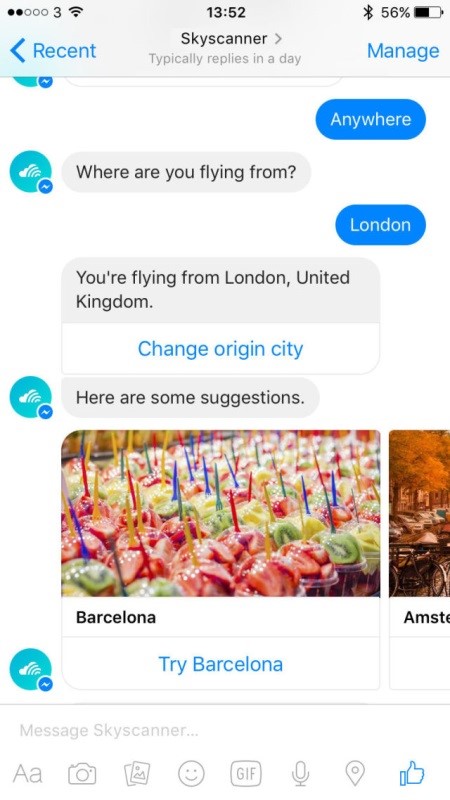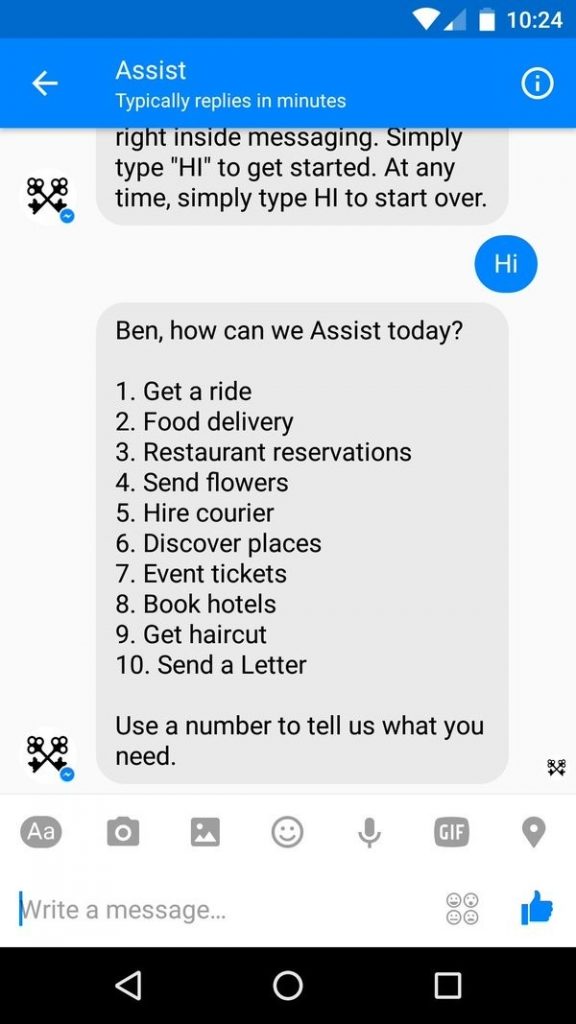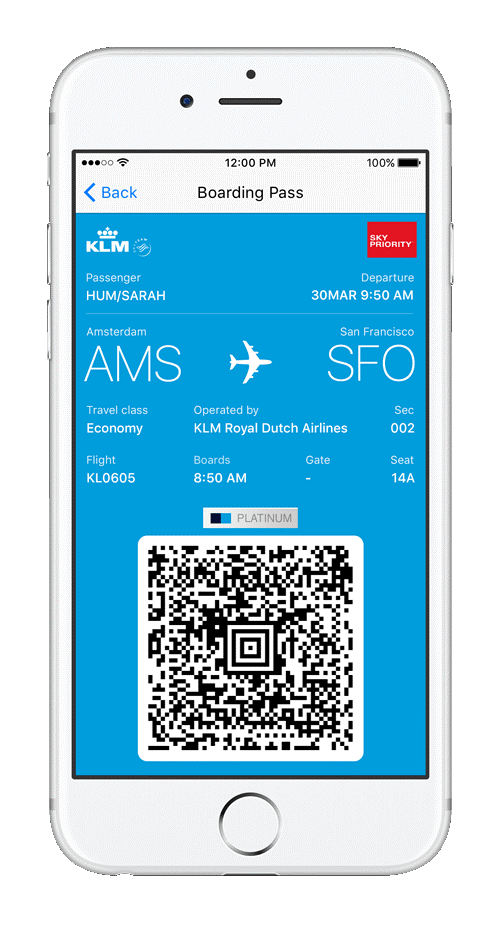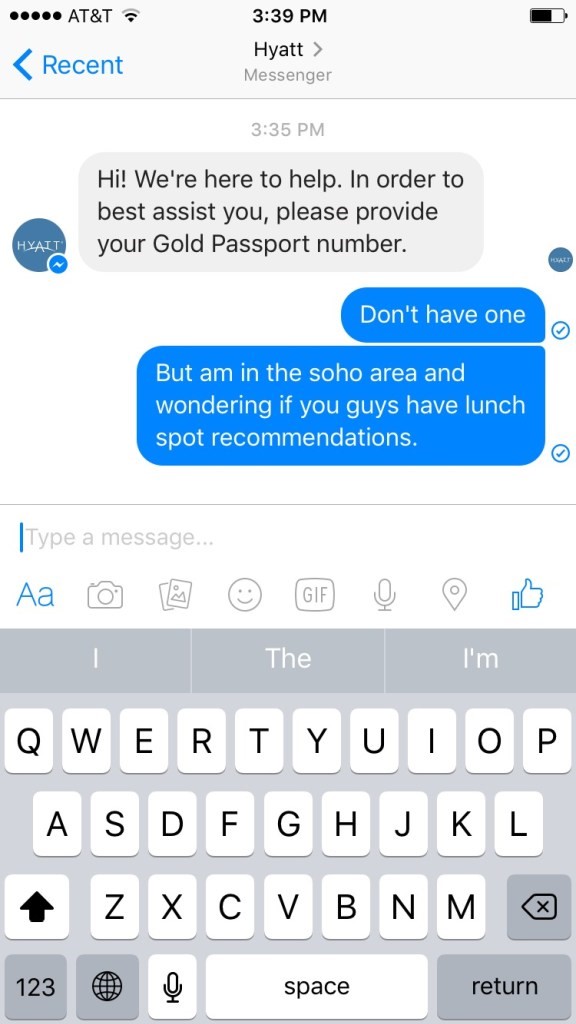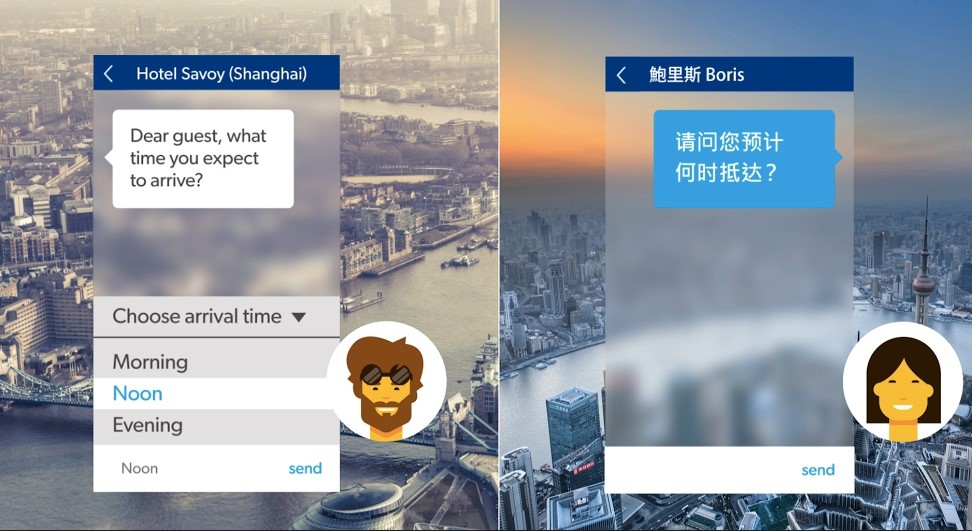Chatbots can help travel businesses by providing a personalized customer experience to those who choose to book their travels online. Chatbots can also operate 24 hours a day, 7 days a week, and can be programmed to interact in many different languages, unlike their human counterparts.
This promising innovation in the world of online messaging involves pieces of software with AI (artificial intelligence), preprogrammed to respond to text chat in a natural way. Chatbots can interact through a variety of messaging platforms, such as WhatsApp, Facebook Messenger, or Slack, among others. They can be used as virtual customer service representatives, which is especially valuable for travel businesses, since one of the latest travel industry trends is an increase in bookings made online rather than over phone or through live travel agents.
Here are five ways your travel business can benefit from chatbots:
1. Enable payments from inside a messaging app
Recently, Facebook chatbots were given the ability to accept online payments from directly within Facebook Messenger.
Using a bot for payments means that customers no longer need to follow a link to complete purchases or bookings on an online site. This simplifies the booking process, and an easier booking process can increase your conversion rates.
There are numerous possibilities for how the payment process could be carried out. For example, the chatbot could ask the customer for their chosen payment method, based on stored payment details. Then the payment could be processed automatically.
2. Act as an online travel agent or reservation agent
As many customers are already using chat apps, there’s no learning curve. They can simply message the chatbot with booking requests. The chatbot can be programmed to respond to natural language such as ‘beach vacation’ or ‘city weekend’. A smart chatbot can act as an online travel agent, taking into account customer preferences and offering personalized suggestions, like a traditional travel agent would. The conversation could continue, carrying out the entire reservation process.
Skyscanner has such a chatbot on Facebook Messenger, as do Expedia and Kayak. It helps travelers through their holiday booking process, finding the best priced flights based on origin, destination, and dates. Once the customer has chosen a flight, they are transferred to the Skyscanner website to complete the process.
The Skyscanner Facebook bot in action
A chatbot could also assist with post-booking communication. For example, it could manage existing reservations or change flight bookings.
Using chatbots as reservation agents is very efficient for both customer and business. It eliminates customer wait times and reduces the expenses involved in running a reservation hotline.
3. Offer suggestions and recommendations on local restaurants, events, shows etc.
Many people use online resources, including social media, when planning a trip. This can be quite a challenge, as there are many resources to search through. Chatbots can streamline this process. Users can ask the chatbot for recommendations. A simple query like ‘local fish restaurant’ could return relevant suggestions. With more sophisticated programming, a chatbot could be designed to respond to a general message like ‘events this evening’ with a list of local events that match customer preferences and history.
One chatbot for businesses to help customers is Assist. It is a bot for SMS and messaging platforms including Facebook Messenger, Slack and Alexa. Assist uses chat to help users book food deliveries, discover places, get tickets for events, and more.
The Assist bot
4. Cater to on-the-go travelers using their mobile devices
According to marketing expert Frederic Gonzalo, 31% of consumers will search their next trip from a mobile device. In addition, making purchases through mobile devices is one of the current main mcommerce trends for millennials. As messaging apps are designed for mobile use, chatbots are the ideal tool for reaching these customers. Customers with smartphones will appreciate being able to search for trip information and make travel bookings without downloading dedicated apps or using websites that are not optimized for mobile use.
After a booking is made, the chatbot is the perfect travel partner, thanks to its knowledge of customer history and preferences. A traveler can take out their smartphone and benefit from direct communication with a virtual customer service agent. For example, a bot assisting with a customer’s flight could provide information about flight times, baggage requirements, boarding gates and more.
Dutch airline KLM recently began using a chatbot on Facebook Messenger to interact with its passengers. Customers can receive booking confirmations, check-in notifications, boarding passes and flight updates all through Messenger.
KLM passengers can receive boarding passes through Facebook Messenger (KLM)
5. Act as a customer service representative and disruption manager
Chatbots can make a huge difference to customer service by responding to customer enquiries directly from within a messaging platform, without the overhead of training and payroll. In addition, customers don’t have to wait to speak to a representative. For example, Hyatt Hotels are using a Facebook chatbot to communicate with guests:
Source: Digiday
Chatbots can handle a variety of customer requests. For example, Uber users can book rides from directly within Facebook Messenger:
It’s also easier for the customer than sending a message through a website, as there’s no need to enter contact details and wait for a response. One of the most common reasons a customer may contact customer service is to change a booking. This process is simple, and it’s a shame to busy representatives with a task that could easily be automated by using a chatbot.
Chatbots can also be used confirm reservations with guests, which can also save representatives time and increase efficiency. Booking.com do this with their messenger chatbot:
Source: Venturebeat
A chatbot can also be used as a disruption manager. One way it can do this is by managing complaints. This is great for businesses, as it takes negative comments away from public forums such as Twitter, where a reputation can easily be tarnished when things go wrong. Instead, a customer is faced with an easy, direct channel of communication through which their complaint can be resolved. In the event that something happens, such as a flight delay, a chatbot could be designed to automatically offer the customer a set of options. For example, it could send a notification and ask the customer if he wants to be booked on the next flight.
Chatbots have a huge potential to change the travel industry and give customers the personalized customer service experience they desire. They can reduce costs, increase efficiency, and increase sales by providing customers with information through natural conversation.

